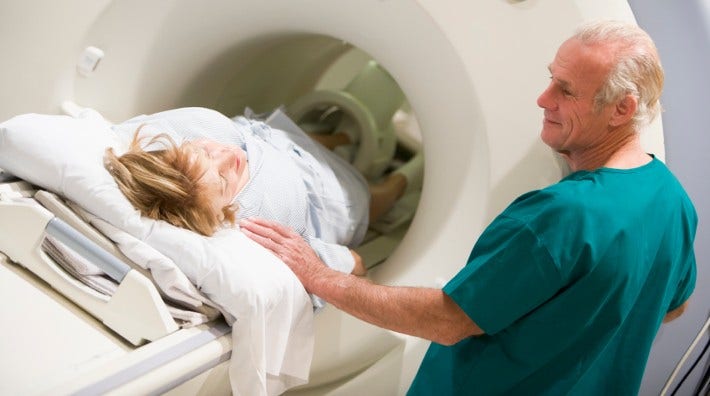Why We Screen for Some Cancers and Not Others

Screening means having a test that looks for cancer or another disease in people who don’t have any symptoms. Some screening tests can find growths and remove them before they have a chance to turn into cancer. Other screening tests, when done regularly, can find cancer early when it's small, hasn't spread, and might be easier to treat.
The benefits of screening tests should be weighed against any risks of the tests themselves. Risks may include anxiety, pain, bleeding, or other side effects. And screening isn’t perfect. Sometimes screening misses cancer. And sometimes it finds something suspicious that turns out to be harmless (called a false-positive), but still needs to be checked out through additional tests that also carry risks and may cause more stress.
This is why the American Cancer Society uses a formal process to review scientific evidence to create guidelines for cancer screening. The guidelines give recommendations about what screening tests people should get, when they should get them, and how frequently the tests should be done.
American Cancer Society Screening Guidelines
The American Cancer Society has guidelines for average-risk adults with recommendations that include regular screening for breast cancer, cervical cancer, prostate cancer, lung cancer, and colorectal cancer, based on eligibility and scientific evidence that shows getting screened regularly may help save lives. For many other cancer types, researchers continue to conduct studies to learn the best ways to find cancer before symptoms appear.
Breast Cancer: Women should have the choice to start yearly screening with a mammogram at age 40 if they wish to do so. All women at average risk of breast cancer should begin yearly screening with a mammogram by age 45. At age 55, women can switch to a mammogram every 2 years, or can continue yearly screening. Women should talk to a health care provider about their own personal risk for breast cancer and about any breast changes they notice. Regular screening should continue for as long as a woman is in good health and expects to live at least 10 more years.
Cervical Cancer: Women and people with a cervix should start regular screening at age 25. Those who are between 25 and 65 should get a primary HPV (human papillomavirus) test every 5 years. If a primary HPV test is not available, a co-test (HPV test combined with a Pap test) should be done every 5 years or a Pap test can be done every 3 years. Those over age 65 who have had regular screening tests with normal results in the past 10 years should no longer be screened for cervical cancer. Some women – because of their history – may need to be screened more often. People vaccinated for HPV should still follow the guideline recommendations. Talk to a health care provider about your history and risk for cervical cancer.
Colorectal Cancer: Adults at average risk should begin regular colorectal screening at age 45, but those at high risk for colorectal cancer based on family and/or personal history or other factors may need to start screening before age 45, be screened more often, or get specific tests. Several different tests can be used to screen for colorectal cancer, including colonoscopy, flexible sigmoidoscopy, guaiac-based fecal occult blood test, and more. Talk with a health care provider about your risk for colorectal cancer and which tests might be good for you, and talk to your insurance provider about your coverage. All abnormal results on non-colonoscopy screening tests should be followed up with a colonoscopy.
Lung Cancer: Screening is recommended for certain people at higher risk for lung cancer. If you are between the ages of 50 and 80 and smoke now or used to smoke, you might benefit from screening for lung cancer with a yearly low-dose CT scan (LDCT). Talk to a health care provider about your risk for lung cancer, how you can quit smoking if you still smoke, and the possible benefits, limits, and harms of lung cancer screening.
Prostate Cancer: Screening recommendations involve making an informed decision when it comes to screening for prostate cancer. This means men should discuss the possible risks and benefits of prostate cancer screening with a health care provider when deciding whether to be screened. Starting at age 50, men should have a discussion about the pros and cons of testing so they can decide if testing is the right choice for them. Men who are African American or have a father or brother who had prostate cancer before age 65, should have this talk with a health care provider starting at age 45.
- Reviewed by
- Helpful resources

The American Cancer Society medical and editorial content team
Our team is made up of doctors and oncology certified nurses with deep knowledge of cancer care as well as editors and translators with extensive experience in medical writing.
American Cancer Society news stories are copyrighted material and are not intended to be used as press releases. For reprint requests, please see our Content Usage Policy.



